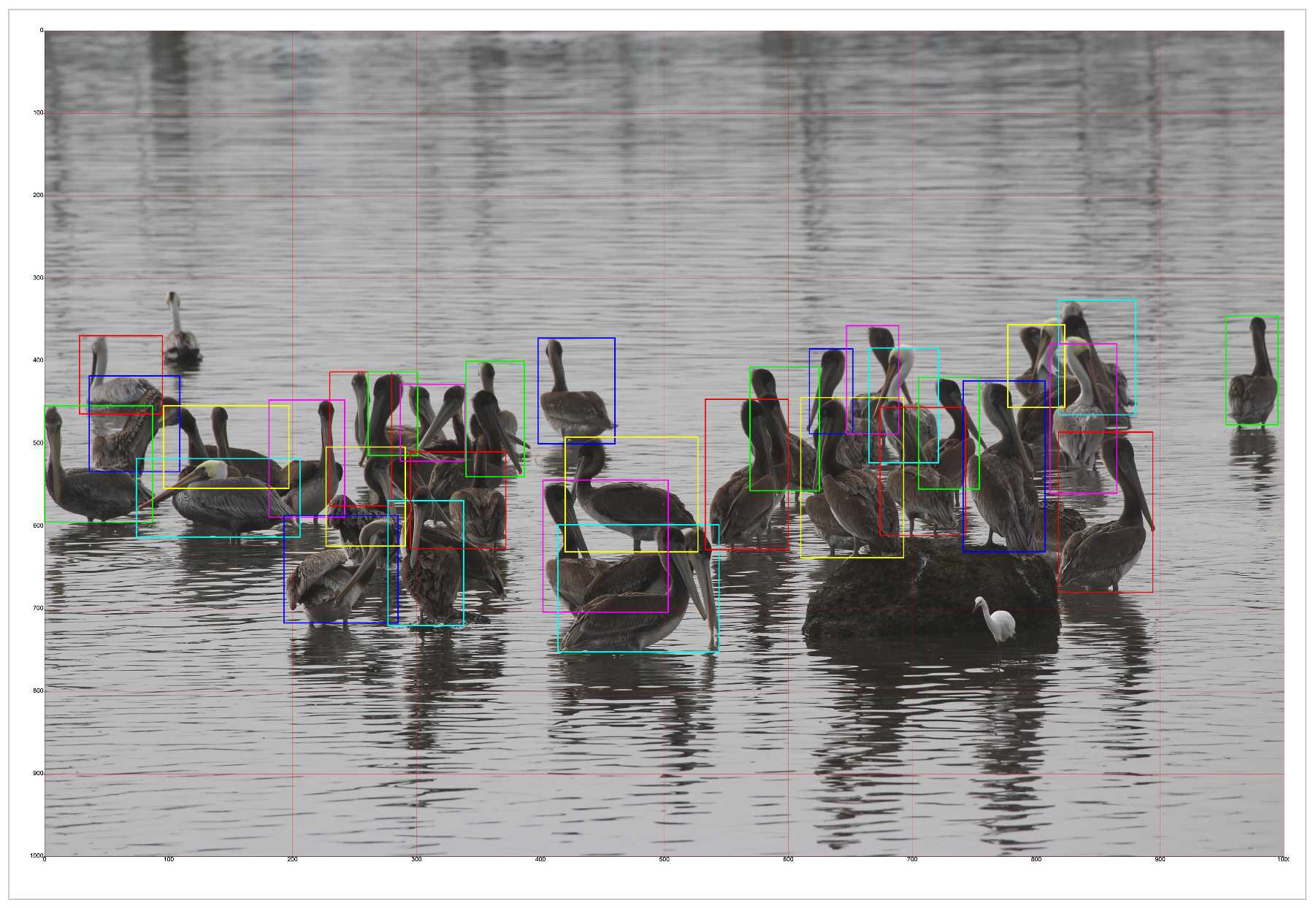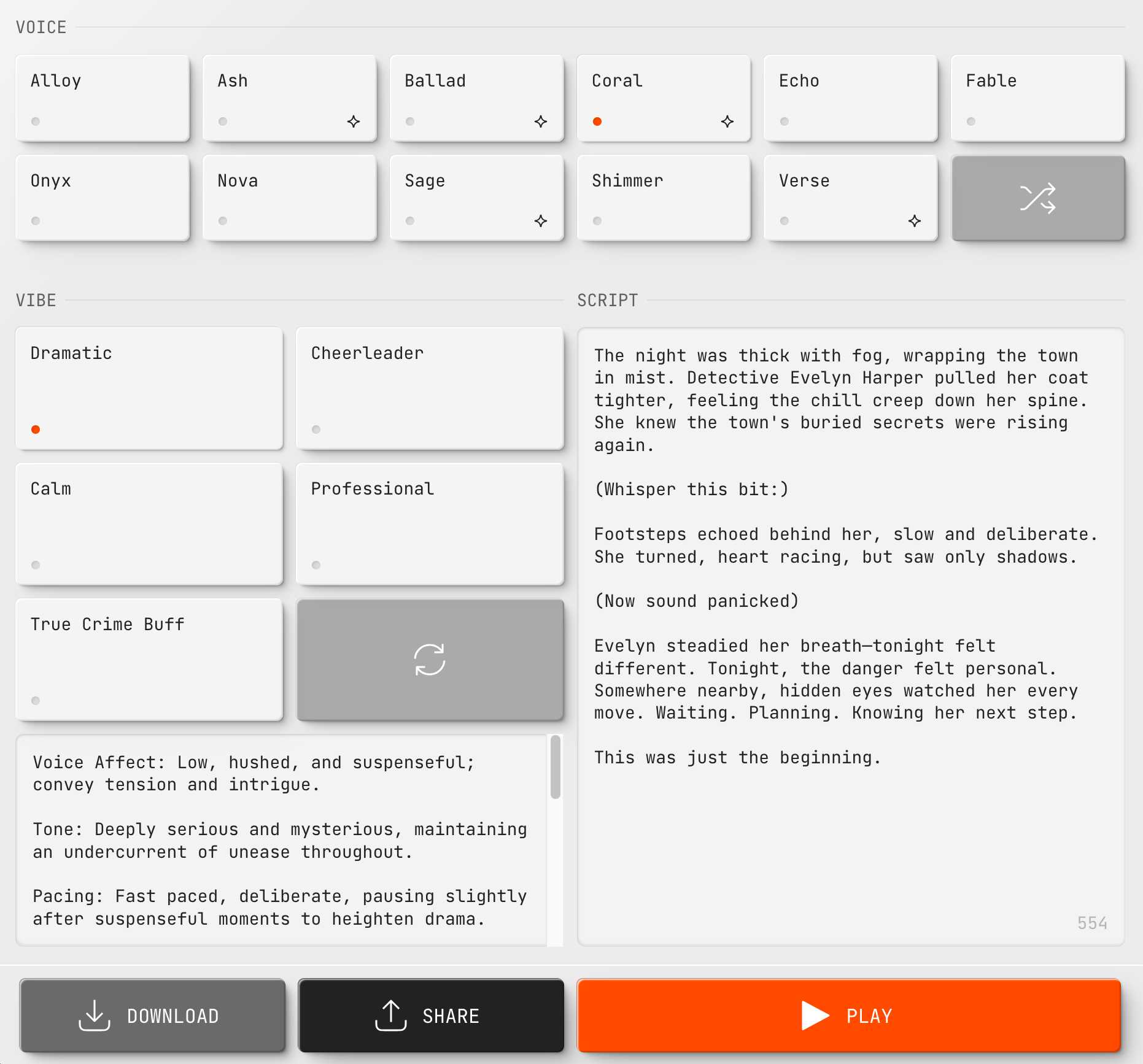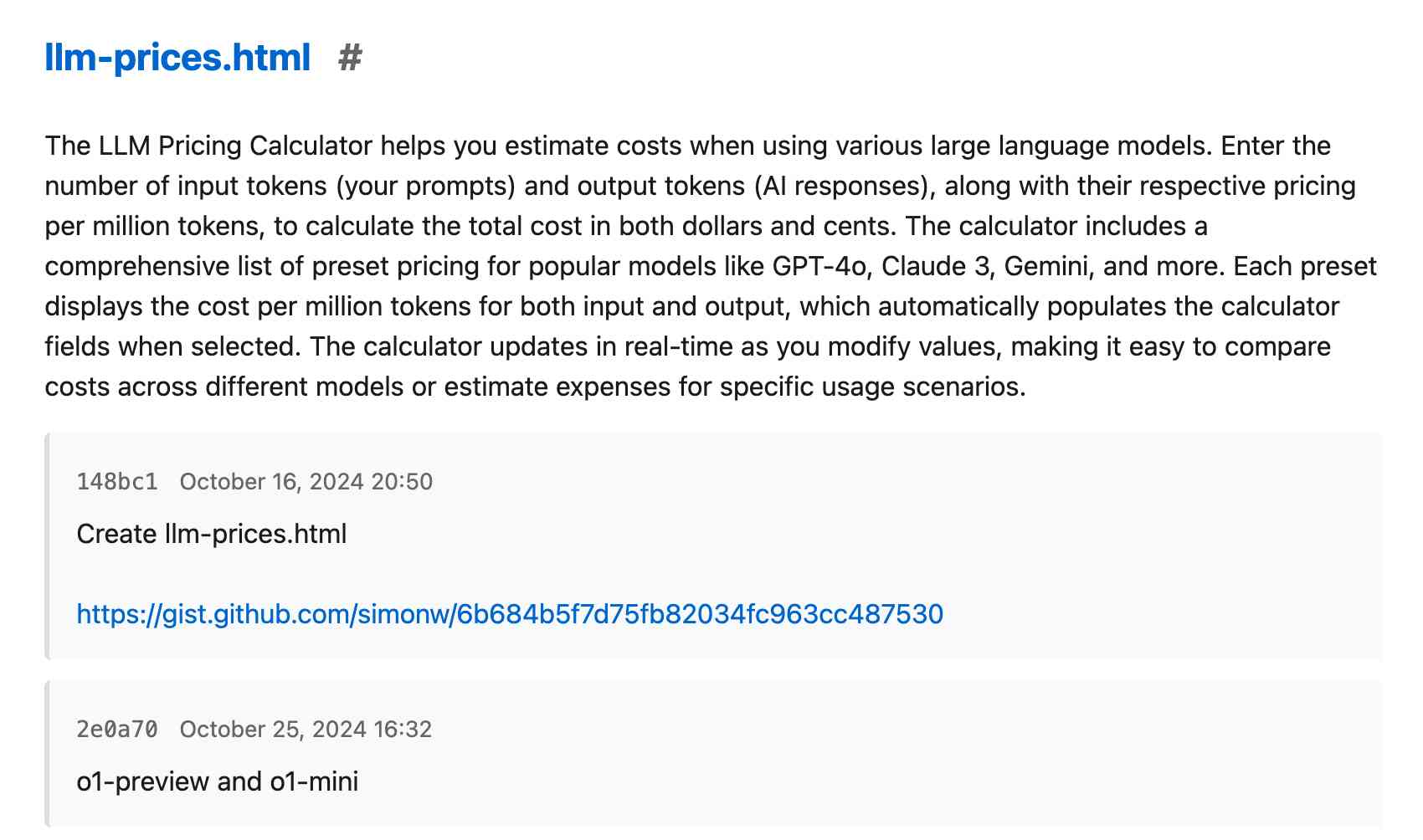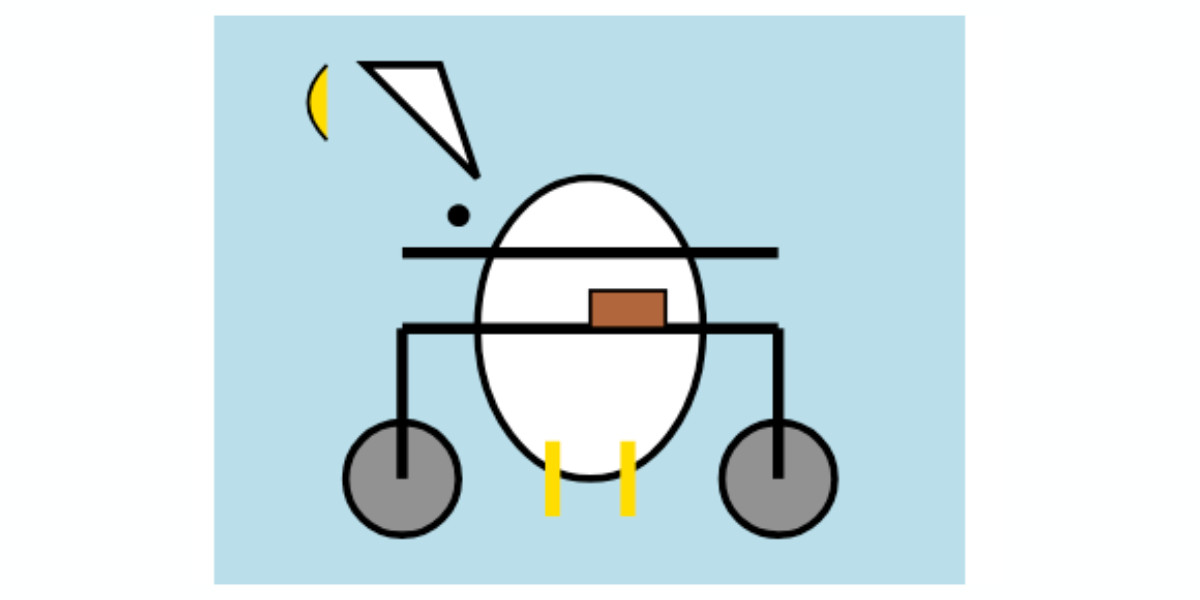1,672 posts tagged “generative-ai”
Machine learning systems that can generate new content: text, images, audio, video and more.
2025
Function calling with Gemma (via) Google's Gemma 3 model (the 27B variant is particularly capable, I've been trying it out via Ollama) supports function calling exclusively through prompt engineering. The official documentation describes two recommended prompts - both of them suggest that the tool definitions are passed in as JSON schema, but the way the model should request tool executions differs.
The first prompt uses Python-style function calling syntax:
You have access to functions. If you decide to invoke any of the function(s), you MUST put it in the format of [func_name1(params_name1=params_value1, params_name2=params_value2...), func_name2(params)]
You SHOULD NOT include any other text in the response if you call a function
(Always love seeing CAPITALS for emphasis in prompts, makes me wonder if they proved to themselves that capitalization makes a difference in this case.)
The second variant uses JSON instead:
You have access to functions. If you decide to invoke any of the function(s), you MUST put it in the format of {"name": function name, "parameters": dictionary of argument name and its value}
You SHOULD NOT include any other text in the response if you call a function
This is a neat illustration of the fact that all of these fancy tool using LLMs are still using effectively the same pattern as was described in the ReAct paper back in November 2022. Here's my implementation of that pattern from March 2023.
MCP 🤝 OpenAI Agents SDK
You can now connect your Model Context Protocol servers to Agents: openai.github.io/openai-agents-python/mcp/
We’re also working on MCP support for the OpenAI API and ChatGPT desktop app—we’ll share some more news in the coming months.
Introducing 4o Image Generation. When OpenAI first announced GPT-4o back in May 2024 one of the most exciting features was true multi-modality in that it could both input and output audio and images. The "o" stood for "omni", and the image output examples in that launch post looked really impressive.
It's taken them over ten months (and Gemini beat them to it) but today they're finally making those image generation abilities available, live right now in ChatGPT for paying customers.
My test prompt for any model that can manipulate incoming images is "Turn this into a selfie with a bear", because you should never take a selfie with a bear! I fed ChatGPT this selfie and got back this result:

That's pretty great! It mangled the text on my T-Shirt (which says "LAWRENCE.COM" in a creative font) and added a second visible AirPod. It's very clearly me though, and that's definitely a bear.
There are plenty more examples in OpenAI's launch post, but as usual the most interesting details are tucked away in the updates to the system card. There's lots in there about their approach to safety and bias, including a section on "Ahistorical and Unrealistic Bias" which feels inspired by Gemini's embarrassing early missteps.
One section that stood out to me is their approach to images of public figures. The new policy is much more permissive than for DALL-E - highlights mine:
4o image generation is capable, in many instances, of generating a depiction of a public figure based solely on a text prompt.
At launch, we are not blocking the capability to generate adult public figures but are instead implementing the same safeguards that we have implemented for editing images of photorealistic uploads of people. For instance, this includes seeking to block the generation of photorealistic images of public figures who are minors and of material that violates our policies related to violence, hateful imagery, instructions for illicit activities, erotic content, and other areas. Public figures who wish for their depiction not to be generated can opt out.
This approach is more fine-grained than the way we dealt with public figures in our DALL·E series of models, where we used technical mitigations intended to prevent any images of a public figure from being generated. This change opens the possibility of helpful and beneficial uses in areas like educational, historical, satirical and political speech. After launch, we will continue to monitor usage of this capability, evaluating our policies, and will adjust them if needed.
Given that "public figures who wish for their depiction not to be generated can opt out" I wonder if we'll see a stampede of public figures to do exactly that!
Update: There's significant confusion right now over this new feature because it is being rolled out gradually but older ChatGPT can still generate images using DALL-E instead... and there is no visual indication in the ChatGPT UI explaining which image generation method it used!
OpenAI made the same mistake last year when they announced ChatGPT advanced voice mode but failed to clarify that ChatGPT was still running the previous, less impressive voice implementation.
Update 2: Images created with DALL-E through the ChatGPT web interface now show a note with a warning:

Putting Gemini 2.5 Pro through its paces
There’s a new release from Google Gemini this morning: the first in the Gemini 2.5 series. Google call it “a thinking model, designed to tackle increasingly complex problems”. It’s already sat at the top of the LM Arena leaderboard, and from initial impressions looks like it may deserve that top spot.
[... 2,400 words]microsoft/playwright-mcp. The Playwright team at Microsoft have released an MCP (Model Context Protocol) server wrapping Playwright, and it's pretty fascinating.
They implemented it on top of the Chrome accessibility tree, so MCP clients (such as the Claude Desktop app) can use it to drive an automated browser and use the accessibility tree to read and navigate pages that they visit.
Trying it out is quite easy if you have Claude Desktop and Node.js installed already. Edit your claude_desktop_config.json file:
code ~/Library/Application\ Support/Claude/claude_desktop_config.json
And add this:
{
"mcpServers": {
"playwright": {
"command": "npx",
"args": [
"@playwright/mcp@latest"
]
}
}
}Now when you launch Claude Desktop various new browser automation tools will be available to it, and you can tell Claude to navigate to a website and interact with it.
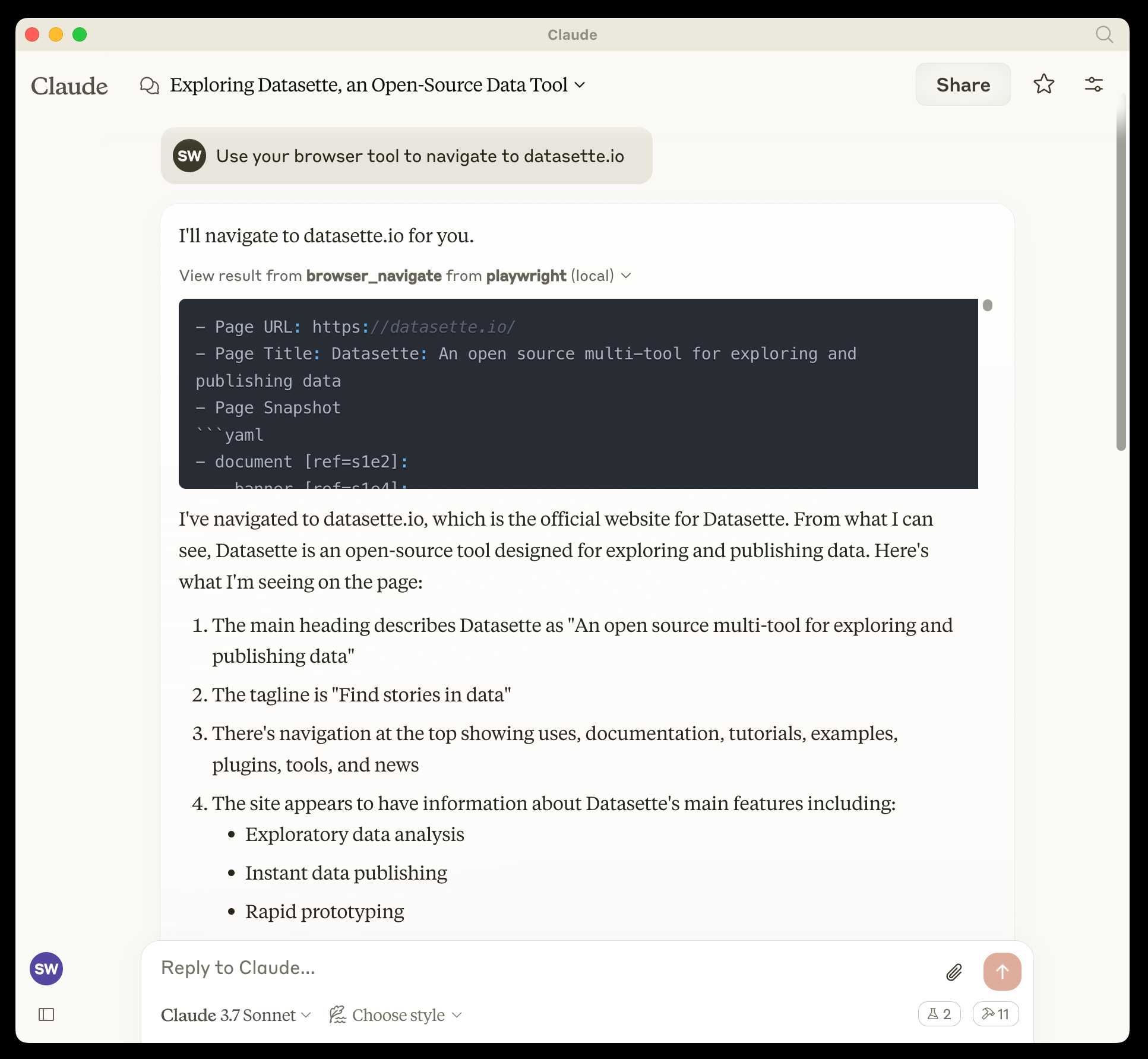
I ran the following to get a list of the available tools:
cd /tmp
git clone https://github.com/microsoft/playwright-mcp
cd playwright-mcp/src/tools
files-to-prompt . | llm -m claude-3.7-sonnet \
'Output a detailed description of these tools'
The full output is here, but here's the truncated tool list:
Navigation Tools (
common.ts)
- browser_navigate: Navigate to a specific URL
- browser_go_back: Navigate back in browser history
- browser_go_forward: Navigate forward in browser history
- browser_wait: Wait for a specified time in seconds
- browser_press_key: Press a keyboard key
- browser_save_as_pdf: Save current page as PDF
- browser_close: Close the current page
Screenshot and Mouse Tools (
screenshot.ts)
- browser_screenshot: Take a screenshot of the current page
- browser_move_mouse: Move mouse to specific coordinates
- browser_click (coordinate-based): Click at specific x,y coordinates
- browser_drag (coordinate-based): Drag mouse from one position to another
- browser_type (keyboard): Type text and optionally submit
Accessibility Snapshot Tools (
snapshot.ts)
- browser_snapshot: Capture accessibility structure of the page
- browser_click (element-based): Click on a specific element using accessibility reference
- browser_drag (element-based): Drag between two elements
- browser_hover: Hover over an element
- browser_type (element-based): Type text into a specific element
Qwen2.5-VL-32B: Smarter and Lighter. The second big open weight LLM release from China today - the first being DeepSeek v3-0324.
Qwen's previous vision model was Qwen2.5 VL, released in January in 3B, 7B and 72B sizes.
Today's Apache 2.0 licensed release is a 32B model, which is quickly becoming my personal favourite model size - large enough to have GPT-4-class capabilities, but small enough that on my 64GB Mac there's still enough RAM for me to run other memory-hungry applications like Firefox and VS Code.
Qwen claim that the new model (when compared to their previous 2.5 VL family) can "align more closely with human preferences", is better at "mathematical reasoning" and provides "enhanced accuracy and detailed analysis in tasks such as image parsing, content recognition, and visual logic deduction".
They also offer some presumably carefully selected benchmark results showing it out-performing Gemma 3-27B, Mistral Small 3.1 24B and GPT-4o-0513 (there have been two more recent GPT-4o releases since that one, 2024-08-16 and 2024-11-20).
As usual, Prince Canuma had MLX versions of the models live within hours of the release, in 4 bit, 6 bit, 8 bit, and bf16 variants.
I ran the 4bit version (a 18GB model download) using uv and Prince's mlx-vlm like this:
uv run --with 'numpy<2' --with mlx-vlm \
python -m mlx_vlm.generate \
--model mlx-community/Qwen2.5-VL-32B-Instruct-4bit \
--max-tokens 1000 \
--temperature 0.0 \
--prompt "Describe this image." \
--image Mpaboundrycdfw-1.pngHere's the image:

And here's the resulting description, which I found to be very impressive:
This image appears to be a map highlighting specific areas along the coastline, likely in California, based on the geographical features and place names. Here is a detailed description of the image:
Geographic Features:
- The map shows a section of the coastline, with land on the right and the sea on the left.
- The land area includes parts of SanMateo County, as noted in the top-right corner.
- The coastline features several named locations, including:
- Point Montara
- Pillar Point
- Kings Rock
- VicenteCreek
- DennistonCreek
- State Beach
Highlighted Areas:
- The map contains two distinct areas marked with different colors:
- Red Area (Top Section)
- Labeled as "MONTARA" and "MONTARA M R" (possibly referring to a "Marine Reserves" or similar protected area).
- This area is marked with a dark red color and extends from the coastline inland.
- Blue Area (Bottom Section)
- Labeled as "PILLAR" and "PILLAR P O I N T" along with "SMCA" (Special Management Area).
- This area is marked with a blue color and is located closer to the coastline, including the area around "Pillar Point."
Depth Contours:
- The map includes depth markings in the sea, indicating the bathymetrical features:
- 20 fathom (fm) line is marked in the upper-left part of the sea.
- 10 fathom (fm) line is marked closer to the coastline.
- 30 fathom (fm) line is marked further out to sea.
Other Features:
- State Beach: Marked near the top-right, indicating a protected recreational area.
- Kings Rock: A prominent feature near the coastline, likely a rocky outcropping.
- Creeks: The map shows several creeks, including VicenteCreek and DennistonCreek, which flow into the sea.
Protected Areas:
- The map highlights specific protected areas:
- Marine Reserves:
- "MONTARA M R" (Marine Reserves) in red.
- Special Management Area (SMCA)
- "PILLAR P O I N T" in blue, indicating a Special Management Area.
Grid and Coordinates:
- The map includes a grid with latitude and longitude markings:
- Latitude ranges from approximately 37°25'N to 37°35'N.
- Longitude ranges from approximately 122°22.5'W to 122°35.5'W.
Topography:
- The land area shows topographic features, including elevations and vegetation, with green areas indicating higher elevations or vegetated land.
Other Labels:
- "SMR": Likely stands for "State Managed Reserves."
- "SMCA": Likely stands for "Special Management Control Area."
In summary, this map highlights specific protected areas along the coastline, including a red "Marine Reserves" area and a blue "Special Management Area" near "Pillar Point." The map also includes depth markings, geographical features, and place names, providing a detailed view of the region's natural and protected areas.
It included the following runtime statistics:
Prompt: 1051 tokens, 111.985 tokens-per-sec
Generation: 760 tokens, 17.328 tokens-per-sec
Peak memory: 21.110 GB
deepseek-ai/DeepSeek-V3-0324.
Chinese AI lab DeepSeek just released the latest version of their enormous DeepSeek v3 model, baking the release date into the name DeepSeek-V3-0324.
The license is MIT (that's new - previous DeepSeek v3 had a custom license), the README is empty and the release adds up a to a total of 641 GB of files, mostly of the form model-00035-of-000163.safetensors.
The model only came out a few hours ago and MLX developer Awni Hannun already has it running at >20 tokens/second on a 512GB M3 Ultra Mac Studio ($9,499 of ostensibly consumer-grade hardware) via mlx-lm and this mlx-community/DeepSeek-V3-0324-4bit 4bit quantization, which reduces the on-disk size to 352 GB.
I think that means if you have that machine you can run it with my llm-mlx plugin like this, but I've not tried myself!
llm mlx download-model mlx-community/DeepSeek-V3-0324-4bit
llm chat -m mlx-community/DeepSeek-V3-0324-4bit
The new model is also listed on OpenRouter. You can try a chat at openrouter.ai/chat?models=deepseek/deepseek-chat-v3-0324:free.
Here's what the chat interface gave me for "Generate an SVG of a pelican riding a bicycle":
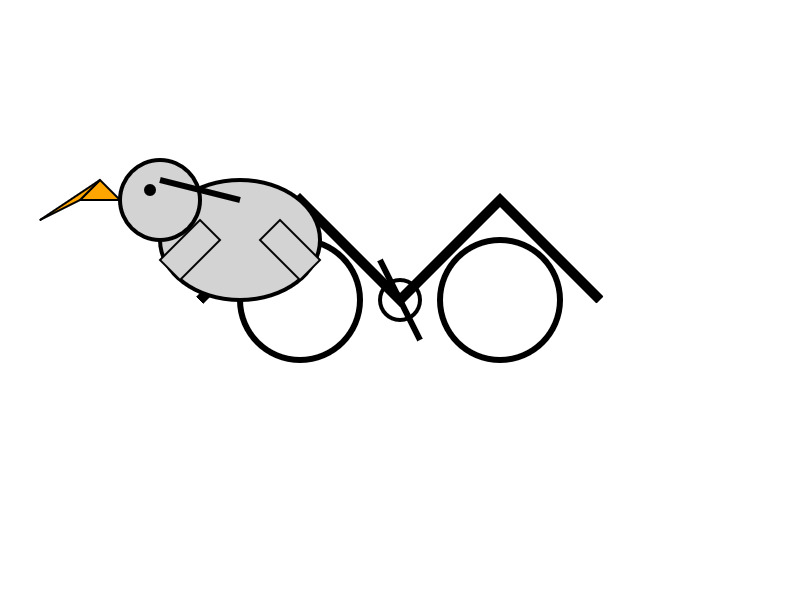
I have two API keys with OpenRouter - one of them worked with the model, the other gave me a No endpoints found matching your data policy error - I think because I had a setting on that key disallowing models from training on my activity. The key that worked was a free key with no attached billing credentials.
For my working API key the llm-openrouter plugin let me run a prompt like this:
llm install llm-openrouter
llm keys set openrouter
# Paste key here
llm -m openrouter/deepseek/deepseek-chat-v3-0324:free "best fact about a pelican"
Here's that "best fact" - the terminal output included Markdown and an emoji combo, here that's rendered.
One of the most fascinating facts about pelicans is their unique throat pouch, called a gular sac, which can hold up to 3 gallons (11 liters) of water—three times more than their stomach!
Here’s why it’s amazing:
- Fishing Tool: They use it like a net to scoop up fish, then drain the water before swallowing.
- Cooling Mechanism: On hot days, pelicans flutter the pouch to stay cool by evaporating water.
- Built-in "Shopping Cart": Some species even use it to carry food back to their chicks.Bonus fact: Pelicans often fish cooperatively, herding fish into shallow water for an easy catch.
Would you like more cool pelican facts? 🐦🌊
In putting this post together I got Claude to build me this new tool for finding the total on-disk size of a Hugging Face repository, which is available in their API but not currently displayed on their website.
Update: Here's a notable independent benchmark from Paul Gauthier:
DeepSeek's new V3 scored 55% on aider's polyglot benchmark, significantly improving over the prior version. It's the #2 non-thinking/reasoning model, behind only Sonnet 3.7. V3 is competitive with thinking models like R1 & o3-mini.
simonw/ollama-models-atom-feed. I setup a GitHub Actions + GitHub Pages Atom feed of scraped recent models data from the Ollama latest models page - Ollama remains one of the easiest ways to run models on a laptop so a new model release from them is worth hearing about.
I built the scraper by pasting example HTML into Claude and asking for a Python script to convert it to Atom - here's the script we wrote together.
Update 25th March 2025: The first version of this included all 160+ models in a single feed. I've upgraded the script to output two feeds - the original atom.xml one and a new atom-recent-20.xml feed containing just the most recent 20 items.
I modified the script using Google's new Gemini 2.5 Pro model, like this:
cat to_atom.py | llm -m gemini-2.5-pro-exp-03-25 \
-s 'rewrite this script so that instead of outputting Atom to stdout it saves two files, one called atom.xml with everything and another called atom-recent-20.xml with just the most recent 20 items - remove the output option entirely'
Here's the full transcript.
The “think” tool: Enabling Claude to stop and think in complex tool use situations (via) Fascinating new prompt engineering trick from Anthropic. They use their standard tool calling mechanism to define a tool called "think" that looks something like this:
{
"name": "think",
"description": "Use the tool to think about something. It will not obtain new information or change the database, but just append the thought to the log. Use it when complex reasoning or some cache memory is needed.",
"input_schema": {
"type": "object",
"properties": {
"thought": {
"type": "string",
"description": "A thought to think about."
}
},
"required": ["thought"]
}
}This tool does nothing at all.
LLM tools (like web_search) usually involve some kind of implementation - the model requests a tool execution, then an external harness goes away and executes the specified tool and feeds the result back into the conversation.
The "think" tool is a no-op - there is no implementation, it just allows the model to use its existing training in terms of when-to-use-a-tool to stop and dump some additional thoughts into the context.
This works completely independently of the new "thinking" mechanism introduced in Claude 3.7 Sonnet.
Anthropic's benchmarks show impressive improvements from enabling this tool. I fully anticipate that models from other providers would benefit from the same trick.
Anthropic Trust Center: Brave Search added as a subprocessor (via) Yesterday I was trying to figure out if Anthropic has rolled their own search index for Claude's new web search feature or if they were working with a partner. Here's confirmation that they are using Brave Search:
Anthropic's subprocessor list. As of March 19, 2025, we have made the following changes:
Subprocessors added:
- Brave Search (more info)
That "more info" links to the help page for their new web search feature.
I confirmed this myself by prompting Claude to "Search for pelican facts" - it ran a search for "Interesting pelican facts" and the ten results it showed as citations were an exact match for that search on Brave.
And further evidence: if you poke at it a bit Claude will reveal the definition of its web_search function which looks like this - note the BraveSearchParams property:
{
"description": "Search the web",
"name": "web_search",
"parameters": {
"additionalProperties": false,
"properties": {
"query": {
"description": "Search query",
"title": "Query",
"type": "string"
}
},
"required": [
"query"
],
"title": "BraveSearchParams",
"type": "object"
}
}New audio models from OpenAI, but how much can we rely on them?
OpenAI announced several new audio-related API features today, for both text-to-speech and speech-to-text. They’re very promising new models, but they appear to suffer from the ever-present risk of accidental (or malicious) instruction following.
[... 866 words]Claude can now search the web. Claude 3.7 Sonnet on the paid plan now has a web search tool that can be turned on as a global setting.
This was sorely needed. ChatGPT, Gemini and Grok all had this ability already, and despite Anthropic's excellent model quality it was one of the big remaining reasons to keep other models in daily rotation.
For the moment this is purely a product feature - it's available through their consumer applications but there's no indication of whether or not it will be coming to the Anthropic API. (Update: it was added to their API on May 7th 2025.) OpenAI launched the latest version of web search in their API last week.
Surprisingly there are no details on how it works under the hood. Is this a partnership with someone like Bing, or is it Anthropic's own proprietary index populated by their own crawlers?
I think it may be their own infrastructure, but I've been unable to confirm that.
Update: it's confirmed as Brave Search.
Their support site offers some inconclusive hints.
Does Anthropic crawl data from the web, and how can site owners block the crawler? talks about their ClaudeBot crawler but the language indicates it's used for training data, with no mention of a web search index.
Blocking and Removing Content from Claude looks a little more relevant, and has a heading "Blocking or removing websites from Claude web search" which includes this eyebrow-raising tip:
Removing content from your site is the best way to ensure that it won't appear in Claude outputs when Claude searches the web.
And then this bit, which does mention "our partners":
The noindex robots meta tag is a rule that tells our partners not to index your content so that they don’t send it to us in response to your web search query. Your content can still be linked to and visited through other web pages, or directly visited by users with a link, but the content will not appear in Claude outputs that use web search.
Both of those documents were last updated "over a week ago", so it's not clear to me if they reflect the new state of the world given today's feature launch or not.
I got this delightful response trying out Claude search where it mistook my recent Squadron automata for a software project:
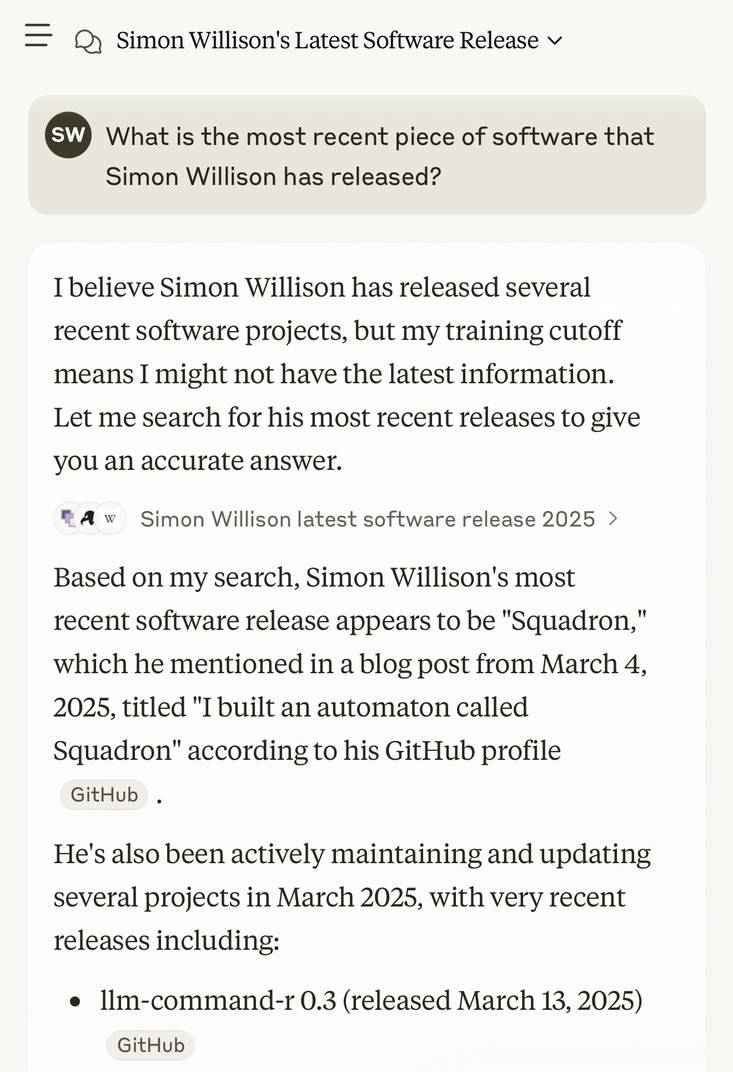
OpenAI platform: o1-pro. OpenAI have a new most-expensive model: o1-pro can now be accessed through their API at a hefty $150/million tokens for input and $600/million tokens for output. That's 10x the price of their o1 and o1-preview models and a full 1,000x times more expensive than their cheapest model, gpt-4o-mini!
Aside from that it has mostly the same features as o1: a 200,000 token context window, 100,000 max output tokens, Sep 30 2023 knowledge cut-off date and it supports function calling, structured outputs and image inputs.
o1-pro doesn't support streaming, and most significantly for developers is the first OpenAI model to only be available via their new Responses API. This means tools that are built against their Chat Completions API (like my own LLM) have to do a whole lot more work to support the new model - my issue for that is here.
Since LLM doesn't support this new model yet I had to make do with curl:
curl https://api.openai.com/v1/responses \
-H "Content-Type: application/json" \
-H "Authorization: Bearer $(llm keys get openai)" \
-d '{
"model": "o1-pro",
"input": "Generate an SVG of a pelican riding a bicycle"
}'
Here's the full JSON I got back - 81 input tokens and 1552 output tokens for a total cost of 94.335 cents.

I took a risk and added "reasoning": {"effort": "high"} to see if I could get a better pelican with more reasoning:
curl https://api.openai.com/v1/responses \
-H "Content-Type: application/json" \
-H "Authorization: Bearer $(llm keys get openai)" \
-d '{
"model": "o1-pro",
"input": "Generate an SVG of a pelican riding a bicycle",
"reasoning": {"effort": "high"}
}'
Surprisingly that used less output tokens - 1459 compared to 1552 earlier (cost: 88.755 cents) - producing this JSON which rendered as a slightly better pelican:

It was cheaper because while it spent 960 reasoning tokens as opposed to 704 for the previous pelican it omitted the explanatory text around the SVG, saving on total output.
Not all AI-assisted programming is vibe coding (but vibe coding rocks)
Vibe coding is having a moment. The term was coined by Andrej Karpathy just a few weeks ago (on February 6th) and has since been featured in the New York Times, Ars Technica, the Guardian and countless online discussions.
[... 1,486 words]My Thoughts on the Future of “AI”. Nicholas Carlini, previously deeply skeptical about the utility of LLMs, discusses at length his thoughts on where the technology might go.
He presents compelling, detailed arguments for both ends of the spectrum - his key message is that it's best to maintain very wide error bars for what might happen next:
I wouldn't be surprised if, in three to five years, language models are capable of performing most (all?) cognitive economically-useful tasks beyond the level of human experts. And I also wouldn't be surprised if, in five years, the best models we have are better than the ones we have today, but only in “normal” ways where costs continue to decrease considerably and capabilities continue to get better but there's no fundamental paradigm shift that upends the world order. To deny the potential for either of these possibilities seems to me to be a mistake.
If LLMs do hit a wall, it's not at all clear what that wall might be:
I still believe there is something fundamental that will get in the way of our ability to build LLMs that grow exponentially in capability. But I will freely admit to you now that I have no earthly idea what that limitation will be. I have no evidence that this line exists, other than to make some form of vague argument that when you try and scale something across many orders of magnitude, you'll probably run into problems you didn't see coming.
There's lots of great stuff in here. I particularly liked this explanation of how you get R1:
You take DeepSeek v3, and ask it to solve a bunch of hard problems, and when it gets the answers right, you train it to do more of that and less of whatever it did when it got the answers wrong. The idea here is actually really simple, and it works surprisingly well.
Mistral Small 3.1. Mistral Small 3 came out in January and was a notable, genuinely excellent local model that used an Apache 2.0 license.
Mistral Small 3.1 offers a significant improvement: it's multi-modal (images) and has an increased 128,000 token context length, while still "fitting within a single RTX 4090 or a 32GB RAM MacBook once quantized" (according to their model card). Mistral's own benchmarks show it outperforming Gemma 3 and GPT-4o Mini, but I haven't seen confirmation from external benchmarks.
Despite their mention of a 32GB MacBook I haven't actually seen any quantized GGUF or MLX releases yet, which is a little surprising since they partnered with Ollama on launch day for their previous Mistral Small 3. I expect we'll see various quantized models released by the community shortly.
Update 20th March 2025: I've now run the text version on my laptop using mlx-community/Mistral-Small-3.1-Text-24B-Instruct-2503-8bit and llm-mlx:
llm mlx download-model mlx-community/Mistral-Small-3.1-Text-24B-Instruct-2503-8bit -a mistral-small-3.1
llm chat -m mistral-small-3.1
The model can be accessed via Mistral's La Plateforme API, which means you can use it via my llm-mistral plugin.
Here's the model describing my photo of two pelicans in flight:
llm install llm-mistral
# Run this if you have previously installed the plugin:
llm mistral refresh
llm -m mistral/mistral-small-2503 'describe' \
-a https://static.simonwillison.net/static/2025/two-pelicans.jpg
The image depicts two brown pelicans in flight against a clear blue sky. Pelicans are large water birds known for their long bills and large throat pouches, which they use for catching fish. The birds in the image have long, pointed wings and are soaring gracefully. Their bodies are streamlined, and their heads and necks are elongated. The pelicans appear to be in mid-flight, possibly gliding or searching for food. The clear blue sky in the background provides a stark contrast, highlighting the birds' silhouettes and making them stand out prominently.
I added Mistral's API prices to my tools.simonwillison.net/llm-prices pricing calculator by pasting screenshots of Mistral's pricing tables into Claude.
Now you don’t even need code to be a programmer. But you do still need expertise. My recent piece on how I use LLMs to help me write code got a positive mention in John Naughton's column about vibe-coding in the Guardian this weekend.
My hunch about Apple Intelligence Siri features being delayed due to prompt injection also got a mention in the most recent episode of the New York Times Hard Fork podcast.
mlx-community/OLMo-2-0325-32B-Instruct-4bit (via) OLMo 2 32B claims to be "the first fully-open model (all data, code, weights, and details are freely available) to outperform GPT3.5-Turbo and GPT-4o mini". Thanks to the MLX project here's a recipe that worked for me to run it on my Mac, via my llm-mlx plugin.
To install the model:
llm install llm-mlx
llm mlx download-model mlx-community/OLMo-2-0325-32B-Instruct-4bit
That downloads 17GB to ~/.cache/huggingface/hub/models--mlx-community--OLMo-2-0325-32B-Instruct-4bit.
To start an interactive chat with OLMo 2:
llm chat -m mlx-community/OLMo-2-0325-32B-Instruct-4bit
Or to run a prompt:
llm -m mlx-community/OLMo-2-0325-32B-Instruct-4bit 'Generate an SVG of a pelican riding a bicycle' -o unlimited 1
The -o unlimited 1 removes the cap on the number of output tokens - the default for llm-mlx is 1024 which isn't enough to attempt to draw a pelican.
The pelican it drew is refreshingly abstract:
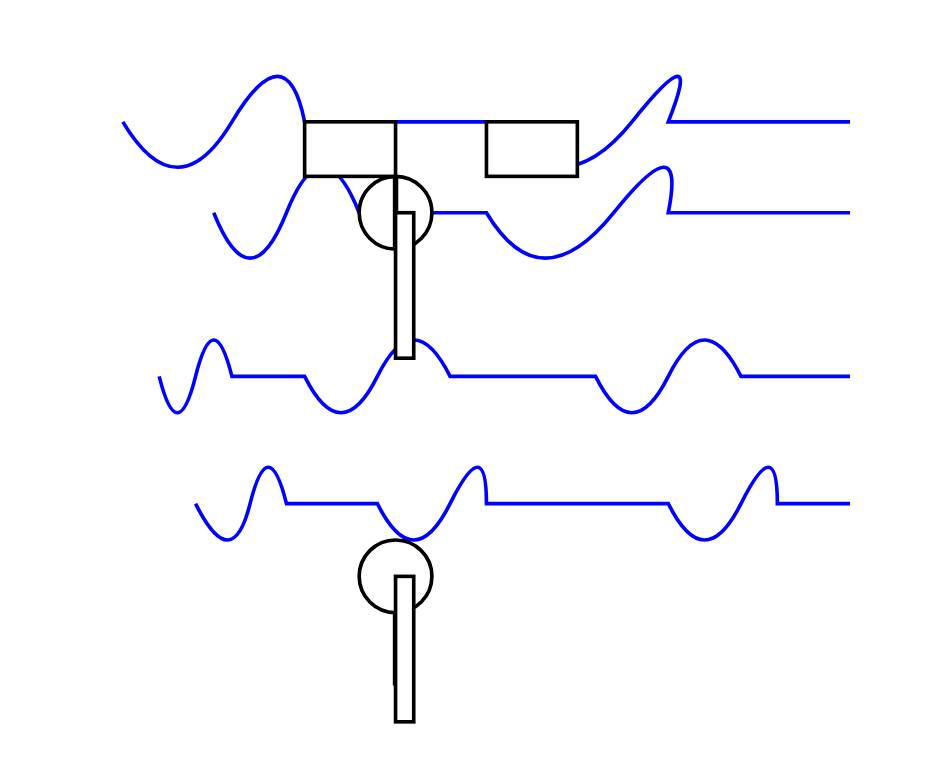
Apple’s Siri Chief Calls AI Delays Ugly and Embarrassing, Promises Fixes (via) Mark Gurman reports on some leaked details from internal Apple meetings concerning the delays in shipping personalized Siri. This note in particular stood out to me:
Walker said the decision to delay the features was made because of quality issues and that the company has found the technology only works properly up to two-thirds to 80% of the time. He said the group “can make more progress to get those percentages up, so that users get something they can really count on.” [...]
But Apple wants to maintain a high bar and only deliver the features when they’re polished, he said. “These are not quite ready to go to the general public, even though our competitors might have launched them in this state or worse.”
I imagine it's a lot harder to get reliable results out of small, local LLMs that run on an iPhone. Features that fail 1/3 to 1/5 of the time are unacceptable for a consumer product like this.
How ProPublica Uses AI Responsibly in Its Investigations. Charles Ornstein describes how ProPublica used an LLM to help analyze data for their recent story A Study of Mint Plants. A Device to Stop Bleeding. This Is the Scientific Research Ted Cruz Calls “Woke.” by Agnel Philip and Lisa Song.
They ran ~3,400 grant descriptions through a prompt that included the following:
As an investigative journalist, I am looking for the following information
--
woke_description: A short description (at maximum a paragraph) on why this grant is being singled out for promoting "woke" ideology, Diversity, Equity, and Inclusion (DEI) or advanced neo-Marxist class warfare propaganda. Leave this blank if it's unclear.
why_flagged: Look at the "STATUS", "SOCIAL JUSTICE CATEGORY", "RACE CATEGORY", "GENDER CATEGORY" and "ENVIRONMENTAL JUSTICE CATEGORY" fields. If it's filled out, it means that the author of this document believed the grant was promoting DEI ideology in that way. Analyze the "AWARD DESCRIPTIONS" field and see if you can figure out why the author may have flagged it in this way. Write it in a way that is thorough and easy to understand with only one description per type and award.
citation_for_flag: Extract a very concise text quoting the passage of "AWARDS DESCRIPTIONS" that backs up the "why_flagged" data.
This was only the first step in the analysis of the data:
Of course, members of our staff reviewed and confirmed every detail before we published our story, and we called all the named people and agencies seeking comment, which remains a must-do even in the world of AI.
I think journalists are particularly well positioned to take advantage of LLMs in this way, because a big part of journalism is about deriving the truth from multiple unreliable sources of information. Journalists are deeply familiar with fact-checking, which is a critical skill if you're going to report with the assistance of these powerful but unreliable models.
Agnel Philip:
The tech holds a ton of promise in lead generation and pointing us in the right direction. But in my experience, it still needs a lot of human supervision and vetting. If used correctly, it can both really speed up the process of understanding large sets of information, and if you’re creative with your prompts and critically read the output, it can help uncover things that you may not have thought of.
Adding AI-generated descriptions to my tools collection
The /colophon page on my tools.simonwillison.net site lists all 78 of the HTML+JavaScript tools I’ve built (with AI assistance) along with their commit histories, including links to prompting transcripts. I wrote about how I built that colophon the other day. It now also includes a description of each tool, generated using Claude 3.7 Sonnet.
[... 741 words]Xata Agent (via) Xata are a hosted PostgreSQL company who also develop the open source pgroll and pgstream schema migration tools.
Their new "Agent" tool is a system that helps monitor and optimize a PostgreSQL server using prompts to LLMs.
Any time I see a new tool like this I go hunting for the prompts. It looks like the main system prompts for orchestrating the tool live here - here's a sample:
Provide clear, concise, and accurate responses to questions. Use the provided tools to get context from the PostgreSQL database to answer questions. When asked why a query is slow, call the explainQuery tool and also take into account the table sizes. During the initial assessment use the getTablesAndInstanceInfo, getPerfromanceAndVacuumSettings, and getPostgresExtensions tools. When asked to run a playbook, use the getPlaybook tool to get the playbook contents. Then use the contents of the playbook as an action plan. Execute the plan step by step.
The really interesting thing is those playbooks, each of which is implemented as a prompt in the lib/tools/playbooks.ts file. There are six of these so far:
SLOW_QUERIES_PLAYBOOKGENERAL_MONITORING_PLAYBOOKTUNING_PLAYBOOKINVESTIGATE_HIGH_CPU_USAGE_PLAYBOOKINVESTIGATE_HIGH_CONNECTION_COUNT_PLAYBOOKINVESTIGATE_LOW_MEMORY_PLAYBOOK
Here's the full text of INVESTIGATE_LOW_MEMORY_PLAYBOOK:
Objective: To investigate and resolve low freeable memory in the PostgreSQL database. Step 1: Get the freeable memory metric using the tool getInstanceMetric. Step 3: Get the instance details and compare the freeable memory with the amount of memory available. Step 4: Check the logs for any indications of memory pressure or out of memory errors. If there are, make sure to report that to the user. Also this would mean that the situation is critical. Step 4: Check active queries. Use the tool getConnectionsGroups to get the currently active queries. If a user or application stands out for doing a lot of work, record that to indicate to the user. Step 5: Check the work_mem setting and shared_buffers setting. Think if it would make sense to reduce these in order to free up memory. Step 6: If there is no clear root cause for using memory, suggest to the user to scale up the Postgres instance. Recommend a particular instance class.
This is the first time I've seen prompts arranged in a "playbooks" pattern like this. What a weird and interesting way to write software!
Today we release OLMo 2 32B, the most capable and largest model in the OLMo 2 family, scaling up the OLMo 2 training recipe used for our 7B and 13B models released in November. It is trained up to 6T tokens and post-trained using Tulu 3.1. OLMo 2 32B is the first fully-open model (all data, code, weights, and details are freely available) to outperform GPT3.5-Turbo and GPT-4o mini on a suite of popular, multi-skill academic benchmarks.
— Ai2, OLMo 2 32B release announcement
Anthropic API: Text editor tool (via) Anthropic released a new "tool" today for text editing. It looks similar to the tool they offered as part of their computer use beta API, and the trick they've been using for a while in both Claude Artifacts and the new Claude Code to more efficiently edit files there.
The new tool requires you to implement several commands:
view- to view a specified file - either the whole thing or a specified rangestr_replace- execute an exact string match replacement on a filecreate- create a new file with the specified contentsinsert- insert new text after a specified line numberundo_edit- undo the last edit made to a specific file
Providing implementations of these commands is left as an exercise for the developer.
Once implemented, you can have conversations with Claude where it knows that it can request the content of existing files, make modifications to them and create new ones.
There's quite a lot of assembly required to start using this. I tried vibe coding an implementation by dumping a copy of the documentation into Claude itself but I didn't get as far as a working program - it looks like I'd need to spend a bunch more time on that to get something to work, so my effort is currently abandoned.
This was introduced as in a post on Token-saving updates on the Anthropic API, which also included a simplification of their token caching API and a new Token-efficient tool use (beta) where sending a token-efficient-tools-2025-02-19 beta header to Claude 3.7 Sonnet can save 14-70% of the tokens needed to define tools and schemas.
Introducing Command A: Max performance, minimal compute (via) New LLM release from Cohere. It's interesting to see which aspects of the model they're highlighting, as an indicator of what their commercial customers value the most (highlights mine):
Command A delivers maximum performance with minimal hardware costs when compared to leading proprietary and open-weights models, such as GPT-4o and DeepSeek-V3. For private deployments, Command A excels on business-critical agentic and multilingual tasks, while being deployable on just two GPUs, compared to other models that typically require as many as 32. [...]
With a serving footprint of just two A100s or H100s, it requires far less compute than other comparable models on the market. This is especially important for private deployments. [...]
Its 256k context length (2x most leading models) can handle much longer enterprise documents. Other key features include Cohere’s advanced retrieval-augmented generation (RAG) with verifiable citations, agentic tool use, enterprise-grade security, and strong multilingual performance.
It's open weights but very much not open source - the license is Creative Commons Attribution Non-Commercial and also requires adhering to their Acceptable Use Policy.
Cohere offer it for commercial use via "contact us" pricing or through their API. I released llm-command-r 0.3 adding support for this new model, plus their smaller and faster Command R7B (released in December) and support for structured outputs via LLM schemas.
(I found a weird bug with their schema support where schemas that end in an integer output a seemingly limitless integer - in my experiments it affected Command R and the new Command A but not Command R7B.)
Notes on Google’s Gemma 3
Google’s Gemma team released an impressive new model today (under their not-open-source Gemma license). Gemma 3 comes in four sizes—1B, 4B, 12B, and 27B—and while 1B is text-only the larger three models are all multi-modal for vision:
[... 804 words]OpenAI Agents SDK. OpenAI's other big announcement today (see also) - a Python library (openai-agents) for building "agents", which is a replacement for their previous swarm research project.
In this project, an "agent" is a class that configures an LLM with a system prompt an access to specific tools.
An interesting concept in this one is the concept of handoffs, where one agent can chose to hand execution over to a different system-prompt-plus-tools agent treating it almost like a tool itself. This code example illustrates the idea:
from agents import Agent, handoff billing_agent = Agent( name="Billing agent" ) refund_agent = Agent( name="Refund agent" ) triage_agent = Agent( name="Triage agent", handoffs=[billing_agent, handoff(refund_agent)] )
The library also includes guardrails - classes you can add that attempt to filter user input to make sure it fits expected criteria. Bits of this look suspiciously like trying to solve AI security problems with more AI to me.
OpenAI API: Responses vs. Chat Completions. OpenAI released a bunch of new API platform features this morning under the headline "New tools for building agents" (their somewhat mushy interpretation of "agents" here is "systems that independently accomplish tasks on behalf of users").
A particularly significant change is the introduction of a new Responses API, which is a slightly different shape from the Chat Completions API that they've offered for the past couple of years and which others in the industry have widely cloned as an ad-hoc standard.
In this guide they illustrate the differences, with a reassuring note that:
The Chat Completions API is an industry standard for building AI applications, and we intend to continue supporting this API indefinitely. We're introducing the Responses API to simplify workflows involving tool use, code execution, and state management. We believe this new API primitive will allow us to more effectively enhance the OpenAI platform into the future.
An API that is going away is the Assistants API, a perpetual beta first launched at OpenAI DevDay in 2023. The new responses API solves effectively the same problems but better, and assistants will be sunset "in the first half of 2026".
The best illustration I've seen of the differences between the two is this giant commit to the openai-python GitHub repository updating ALL of the example code in one go.
The most important feature of the Responses API (a feature it shares with the old Assistants API) is that it can manage conversation state on the server for you. An oddity of the Chat Completions API is that you need to maintain your own records of the current conversation, sending back full copies of it with each new prompt. You end up making API calls that look like this (from their examples):
{
"model": "gpt-4o-mini",
"messages": [
{
"role": "user",
"content": "knock knock.",
},
{
"role": "assistant",
"content": "Who's there?",
},
{
"role": "user",
"content": "Orange."
}
]
}These can get long and unwieldy - especially when attachments such as images are involved - but the real challenge is when you start integrating tools: in a conversation with tool use you'll need to maintain that full state and drop messages in that show the output of the tools the model requested. It's not a trivial thing to work with.
The new Responses API continues to support this list of messages format, but you also get the option to outsource that to OpenAI entirely: you can add a new "store": true property and then in subsequent messages include a "previous_response_id: response_id key to continue that conversation.
This feels a whole lot more natural than the Assistants API, which required you to think in terms of threads, messages and runs to achieve the same effect.
Also fun: the Response API supports HTML form encoding now in addition to JSON:
curl https://api.openai.com/v1/responses \
-u :$OPENAI_API_KEY \
-d model="gpt-4o" \
-d input="What is the capital of France?"
I found that in an excellent Twitter thread providing background on the design decisions in the new API from OpenAI's Atty Eleti. Here's a nitter link for people who don't have a Twitter account.
New built-in tools
A potentially more exciting change today is the introduction of default tools that you can request while using the new Responses API. There are three of these, all of which can be specified in the "tools": [...] array.
{"type": "web_search_preview"}- the same search feature available through ChatGPT. The documentation doesn't clarify which underlying search engine is used - I initially assumed Bing, but the tool documentation links to this Overview of OpenAI Crawlers page so maybe it's entirely in-house now? Web search is priced at between $25 and $50 per thousand queries depending on if you're using GPT-4o or GPT-4o mini and the configurable size of your "search context".{"type": "file_search", "vector_store_ids": [...]}provides integration with the latest version of their file search vector store, mainly used for RAG. "Usage is priced at $2.50 per thousand queries and file storage at $0.10/GB/day, with the first GB free".{"type": "computer_use_preview", "display_width": 1024, "display_height": 768, "environment": "browser"}is the most surprising to me: it's tool access to the Computer-Using Agent system they built for their Operator product. This one is going to be a lot of fun to explore. The tool's documentation includes a warning about prompt injection risks. Though on closer inspection I think this may work more like Claude Computer Use, where you have to run the sandboxed environment yourself rather than outsource that difficult part to them.
I'm still thinking through how to expose these new features in my LLM tool, which is made harder by the fact that a number of plugins now rely on the default OpenAI implementation from core, which is currently built on top of Chat Completions. I've been worrying for a while about the impact of our entire industry building clones of one proprietary API that might change in the future, I guess now we get to see how that shakes out!
Here’s how I use LLMs to help me write code
Online discussions about using Large Language Models to help write code inevitably produce comments from developers who’s experiences have been disappointing. They often ask what they’re doing wrong—how come some people are reporting such great results when their own experiments have proved lacking?
[... 5,178 words]llm-openrouter 0.4. I found out this morning that OpenRouter include support for a number of (rate-limited) free API models.
I occasionally run workshops on top of LLMs (like this one) and being able to provide students with a quick way to obtain an API key against models where they don't have to setup billing is really valuable to me!
This inspired me to upgrade my existing llm-openrouter plugin, and in doing so I closed out a bunch of open feature requests.
Consider this post the annotated release notes:
- LLM schema support for OpenRouter models that support structured output. #23
I'm trying to get support for LLM's new schema feature into as many plugins as possible.
OpenRouter's OpenAI-compatible API includes support for the response_format structured content option, but with an important caveat: it only works for some models, and if you try to use it on others it is silently ignored.
I filed an issue with OpenRouter requesting they include schema support in their machine-readable model index. For the moment LLM will let you specify schemas for unsupported models and will ignore them entirely, which isn't ideal.
llm openrouter keycommand displays information about your current API key. #24
Useful for debugging and checking the details of your key's rate limit.
llm -m ... -o online 1enables web search grounding against any model, powered by Exa. #25
OpenRouter apparently make this feature available to every one of their supported models! They're using new-to-me Exa to power this feature, an AI-focused search engine startup who appear to have built their own index with their own crawlers (according to their FAQ). This feature is currently priced by OpenRouter at $4 per 1000 results, and since 5 results are returned for every prompt that's 2 cents per prompt.
llm openrouter modelscommand for listing details of the OpenRouter models, including a--jsonoption to get JSON and a--freeoption to filter for just the free models. #26
This offers a neat way to list the available models. There are examples of the output in the comments on the issue.
- New option to specify custom provider routing:
-o provider '{JSON here}'. #17
Part of OpenRouter's USP is that it can route prompts to different providers depending on factors like latency, cost or as a fallback if your first choice is unavailable - great for if you are using open weight models like Llama which are hosted by competing companies.
The options they provide for routing are very thorough - I had initially hoped to provide a set of CLI options that covered all of these bases, but I decided instead to reuse their JSON format and forward those options directly on to the model.
